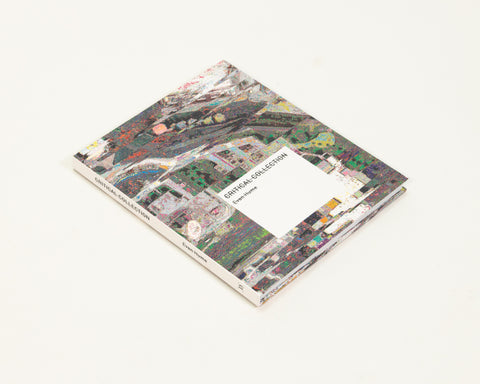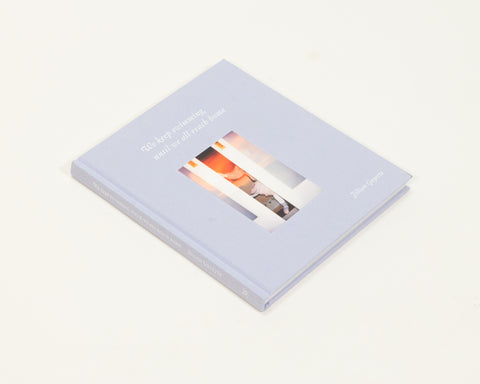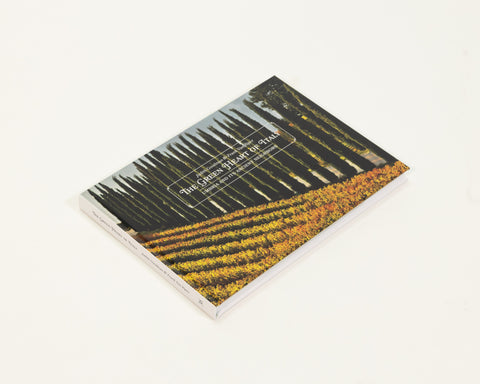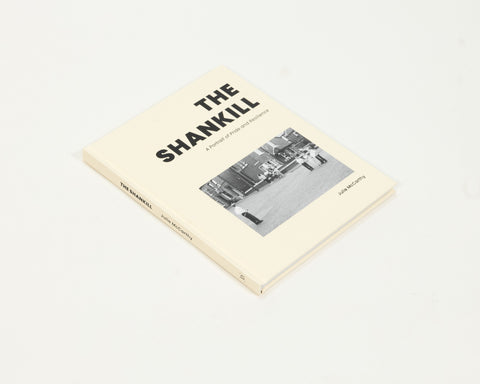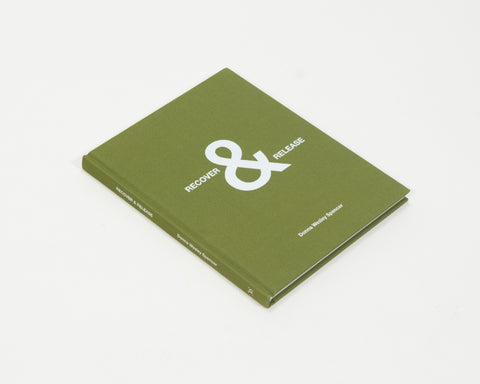Currently living in Uganda, Tadej Žnidarčič is a photographer originally from Ljubljana, Slovenia. A contributing photographer for Redux Pictures, Žnidarčič's photographs have appeared in magazines, newspapers and various publications in the USA, UK, Italy, Germany, France, Holland, Nigeria and Slovenia. An exhibition of Žnidarčič's most recent project Being Gay in Uganda is currently on view at New York's OSI (The Open Society Documentary Photography Project). Žnidarčič is one of seven photographers at OSI's Moving Walls 18—an exhibition about relationships between identity, home, belonging and how perceptions of self are shaped by external environments.
Being Gay in Uganda documents LGBT activists and non-activists in Uganda. Photographed from behind, participants avoid persecution by remaining anonymous. Shown alongside excerpts from interviews, Žnidarčič's photographs frame portraits of a struggle highlighting the conflicts between presence and concealment.
What follows is an interview with Žnidarčič conducted in March and April of 2011, after the opening of Being Gay In Uganda at OSI.
Patricia: Let's start at the beginning. Are you based in Uganda for this project or other reasons?
Tadej: This is one of the projects that I have been working on in Uganda. Initially, I was invited to accompany a friend of mine, a Slovene artist, who had an opportunity to design and build a cinema/community center at a village in the north of Uganda. He wanted to get to know the people who would be working with him: their ideas, what could be done. But he didn't have time to go—so I went. On that first trip I met others working in film and photography. I saw Uganda as a nice place where I could do some stories and I decided to return and spend more time here.
Patricia: How long have you been in Uganda?
Tadej: On and off for about a year and half.
Patricia: What drew you into this subject matter?
Tadej: It was the introduction of The Anti-Homosexuality Bill in Ugandan parliament at the end of 2009. The Bill proposed life imprisonment for anyone engaged in homosexual activities and the death penalty for “aggravated homosexuality.” The bill was met with opposition from human rights groups, Western governments, and some religious leaders. It is still in the parliament, its fate unclear. Whatever happens with the bill, it is an indication of anti-gay sentiments in Ugandan society which is openly homophobic and sees itself as setting an example for how the rest of the world should deal with homosexuals.
When the bill came out, Ugandan and international media reports largely focused on its creation, context and consequences. Some activists were interviewed and they agreed to be identified, but the vast majority of the gay community didn't want to be identified. Their stories were untold. I was interested in those experiences and started to think how I could approach this sensitive subject.
Patricia: Portraits are infinitely interesting to me. Will you elaborate on your decisions of subject framing in the portraits for Being Gay In Uganda?
Tadej: All the people I talked to wanted to remain anonymous so I portrayed them without compromising their safety. I didn't want to 'reduce' them to only their feet, hands or clothing, or hide their faces in one way or another. In this case, I think showing only their hands or clothing wouldn't say much about them and the situation they face every day. Since we see the 'complete' person, but the person is not facing us, the question arises: why can't they show their face? Why can't they face us? That's what I would like people to think about when they see these images.
Another element is that they stand in front of ugly, crumbling walls. These walls symbolize the obstacles they face and their exclusion from society. That, and since the bill proposes the death penalty for homosexuals, a wall is something people get executed in front of. As a series, the portraits work as a group—unified by exact framing—in which each person is an individual, with his or her own posture, clothing, and accessories.
Patricia: This manner of portraiture magnifies body language. The psychology of the stance, for example. What similarities did you find in your collaborators? Did you notice variance in how individuals facing the same wall, the same possibility of danger—how did they move differently for the camera?
Tadej: Most photos were taken in the street and subjects wanted them done quickly. I think not only since they were facing a wall, but also since they couldn't see what was happening behind their backs – if we would attract unwanted attention. So, some were a bit uncomfortable, while others remained relaxed, confident. I think this reflects their attitude and can be seen in their posture, the way they stand, what they do with their hands.
Patricia: Framing portraits from the back of the body eliminates some degree of gender visibility. It can be more liberated that way, making the cause more inclusive, rather than a dyke or a gay thing. But that's just my opinion. Looking at the photographs, just comparing the shoulders, how weight is distributed through the stance, what is inflected with the body...is very powerful.
Tadej: I think it is more inclusive just by the fact that all people are framed the same way. There is no distinction. And in one case, I would say because of the posture and hair style, the portrait of one woman has been thought of on several occasions as being of a man. Some collaborators were less comfortable and others more comfortable in being photographed from behind. Some took a very affirmative, confident stance and others were a bit anxious.
Patricia: So, were there safety concerns for the activists? Just by being seen with you, an outsider, a photographer? Did you experience scrutiny as a result of the homophobic environment?
Tadej: I wouldn't say there were safety concerns. When we were working, people couldn't know what we were doing, what these photographs were about. And I could be perceived as a foreign photographer only for those short moments when we took the photos. But for most of the time, we just talked like any Ugandan and foreigner would. Only once did someone ask why I was photographing this man from behind. The subject said we were friends and that it was an art project. The man then replied that next time, maybe I could photograph him that way...
Patricia: How are individuals protected from danger and anger directed at LGBT population?
Tadej: LGBT organizations offer help if someone is in trouble. For example: if you've been outed or are perceived to be gay, and must leave your house quickly, they will find you a safe place to stay.
Patricia: What are the names of the organizations and do they advertise?
Some of the organizations are Spectrum, FARUG, SMUG, Icebreakers. These have websites, others don't.
Patricia: Any social system ruled by fear, control, paranoia—it creates a very fragmented culture with high levels of distrust. Trust seems like the most important word in your project. As a viewer, I begin with their trust in you. But personally, and civically, knowing who to trust in this environment seems like life/death. Am I over-dramatizing as an outsider?
Tadej: Yes, who to trust is very important. A person can get into a lot of trouble once identified as LGBT, are perceived as one, or are outed in the papers. That's why most of the people in the gay community don't want to be identified. The ones who are identified become at risk of losing their job, being harassed, blackmailed, beaten, or even killed—like David Kato. Most people hide their identity in the company of strangers. If the bill is passed in its original form, the risks for them will be even greater. That's why very few people agree to show their face.
Patricia: When I read that in Uganda homosexuality is equated to anti "family-based" society, it makes me think of how environments ruled by fear, control, paranoia and distrust also break down the foundations for family as a unit. Isn't political instability in itself anti-family?
Tadej: I think political instability affects society as a whole and can tear families apart if the members diverge in opinions, orientations, etc...but it can also bring families together. The members of the family can be the only people you can trust. It really depends. In case of families with members who are homosexual, people sometimes get thrown out of their homes, are disowned, and parents don't want to see their children anymore. The situation will worsen if the bill is passed, since the bill states that anyone who knows anyone who is homosexual should report that person to the police within 24 hours. In that case, one can expect a lot of suspicion among family members, false reports, blackmailing, etc., even in 'hetero' families. That will create a lot of trouble.
Patricia: So, the definition of family is conformity.
Tadej: Here, family is perceived as father, mother, children. And then an extended family of uncles, aunts, cousins. Standing out from the norm is generally not something people in Uganda do. And if the bill is passed, people will make sure they are not seen out of the norm.
Patricia: I've been really struck by the diasporic reach of Uganda's Anti-Homosexuality Bill. It applies to Ugandan citizens beyond residents of Uganda. Homosexuality holds the same value as treason. What does this mean to the fragility and community of the Uganda diaspora?
Tadej: I am not familiar with Ugandan diaspora, but I can imagine it could create a lot of problems for people living abroad. You might not be able to travel back home anymore since someone might have reported you. Or they would report you unless you pay them. It could create a lot of suspicion in the diaspora.
Patricia: Amidst the conservative nationalism and fundamentalist salvation strategies, the psychological isolation must be alarmingly damaging for Ugandan citizens. The fear of being outed, the impossibility of escape. What services are available to help individuals cope with this? How are people coping and making the most of their lives under these conditions?
Tadej: People try to continue their lives, hope not to be outed and find support within the community. Many have stopped going to their original churches, since the pastors are so hostile towards homosexuals. They pray at home and hang out with other members of the LGBT community. If they have a job, sexuality is hidden.
Patricia: In a hyper vigilant society like this, how can sexuality be hidden? How does concealing one's sexual preference play out?
Tadej: Some men get married in order to be perceived as straight. But generally, I haven't seen friends pretending to be couples. It is less of an issue in the city, but I imagine it can happen in the villages or smaller towns where it is harder to be anonymous. It is customary in Uganda for friends of the same sex, especially men, to hold hands in public. So unless you are deliberately attempting to display your sexual preference in public—and you don't dress in a certain way—it is difficult to detect sexual preference and people don't notice. In private and certain places where LGBTI hang out, it is there that people are open about their sexuality.
Patricia: Homosexuality is already illegal in Uganda under colonial-era laws. Are all LGBT citizens subject to the same treatment? I find it hard to believe that there are no homosexuals in high-ranking government positions.
Tadej: Already now, people can be imprisoned for “carnal knowledge against the order of nature”, attempts at such knowledge or “gross indecency”. In practice, that means one has to be caught in the act, be accused of attempting to do the act. It's quite possible there are homosexuals in high-ranking government positions, but they don't get accused of committing homosexual offenses. Being accused of being homosexual can end your career, but on the other hand: it is a convenient way to get rid of an opponents or tarnish someone's name.
Patricia: What has been the impact of David Kato's murder earlier this year? Has it made some retreat and others more vocal in Uganda?
Tadej: Yes, I would say both. Some went more into hiding, while others, clearly outraged, stepped out and became more vocal.
Patricia: Have there been other murders from the Rolling Stone list of prominent gay activists?
Tadej: No, I don't believe so.
Patricia: Why do you think homosexuality as a basic human right is such a difficult concept for most Ugandans to grasp?
Tadej: Most Ugandans don't think it is a human right. There is a lot of misinformation in Uganda and people believe what they are told on a daily basis by the authorities: in schools, churches, on the radio, newspapers, TV, politicians, etc. They are being told it's a sinful choice imported from the West that threatens to destroy families. They say homosexuals recruit children for their devious acts, so the lawmakers have to protect society—and the children.
Patricia: I've read that homosexual pedophiles get the death penalty, but a homosexual can be jailed for 7 years. Are there gender imbalances in prosecutions? Are all homosexual criminals treated equally in terms of gender?
Tadej: Having sex with a minor is already an offense that can carry capital punishment, regardless if it's a homo or hetero sexual act. And homosexuals can already be jailed under existing 'sodomy' law. I don't know about gender imbalances in prosecutions, but from what I have heard, I'd say women are prosecuted less for homosexual acts since it is more difficult to prove.
Patricia: Scott Lively is an American evangelical pastor from Springfield MA and the author of The Pink Swastika, which claims the Nazi party was a homosexual movement. Months before this bill was crafted, Lively spoke in Uganda at a "Seminar on Exposing the Homosexual Agenda". He has been quoted as saying: "These are good Christians; better Christians than there are here in the states," says Lively. "They care about each other. And I think the reason they're pushing so hard on this law is that they don't want to see what happened to our country happen over there.**" Can the anti-homosexuality conservatism in Uganda be traced to a form of anti-American sentiment?
Tadej: I think American evangelicals and the workshop on 'gay agenda' they held in Kampala in March 2009 played a role in crafting the bill. Lively and others are pushing their agenda, trying to fight their war in a different country and they found a receptive audience in Uganda. But I don't think people in Uganda are anti-American just because the human rights of homosexuals are accepted in the U.S. Even the proponents of the bill, I don't think they are anti-American. However, they might think that America and the West in general have lost their way.
Patricia: What are you working on now? How is this project unfolding itself?
Tadej: I've started to look into generational issues, focusing on women, young people. My experiences here have shown me a side of the country that is typically not presented in the West and I'm looking into how to present it. People in the LGBT project were very open with telling their stories because they wanted their experiences known. As we spoke before, regarding the hiding of identity in public, I think it's harder for people in towns and villages to remain anonymous. So, I plan to expand this project beyond Kampala (the capital) to highlight the experiences of people confronting different environments.
Moving Walls 18 will be at OSI-New York Monday through Friday, 9:00 a.m. – 4:30 p.m., from March 17-October 14, 2011 by appointment only. To schedule a visit, contact the Documentary Photography Project at (212) 547-6909.
(**) http://abcnews.go.com/Nightline/anti-homosexuality-bill-uganda-global-uproar/story?id=10045436






